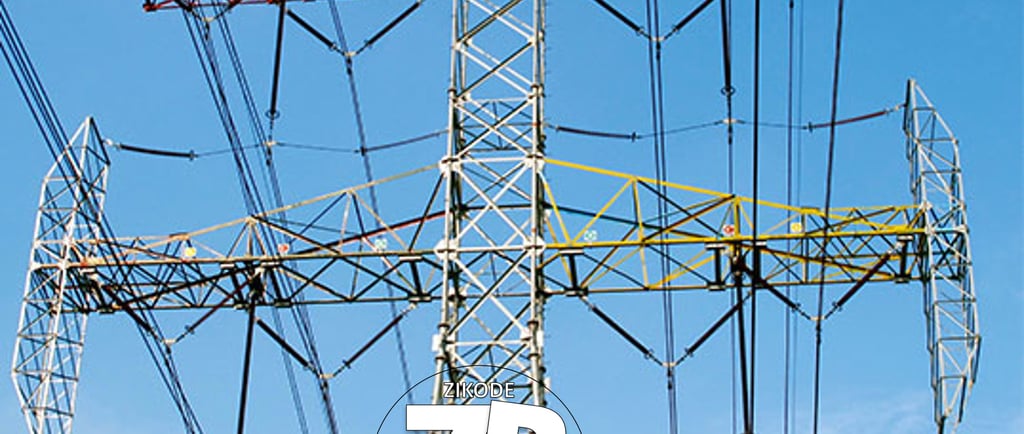PARLIAMENTARY COMMITTEE CALLS FOR URGENT ACTION ON MUNICIPAL ELECTRICITY DEBT CRISIS
Attendees included representatives from Eskom, National Treasury, the Department of Cooperative Governance and Traditional Affairs (COGTA), and the South African Local Government Association (SALGA). The primary goal of the meeting was to find sustainable solutions to the financial challenges affecting municipalities' ability to meet their obligations and maintain electricity supply to millions of South Africans.
EZOMPHAKATHI


Parliament, Friday, 28 March 2025 – The Portfolio Committee on Electricity and Energy convened a high-level meeting this week in Gauteng, bringing together key stakeholders to address the mounting municipal electricity debt crisis, which has now escalated to nearly R100 billion.
Attendees included representatives from Eskom, National Treasury, the Department of Cooperative Governance and Traditional Affairs (COGTA), and the South African Local Government Association (SALGA). The primary goal of the meeting was to find sustainable solutions to the financial challenges affecting municipalities' ability to meet their obligations and maintain electricity supply to millions of South Africans.
ESCALATING DEBT THREATENS SERVICE DELIVERY
The committee underscored the severity of the crisis, highlighting that over 160 municipalities are financially distressed. Of these, 98 are operating on unfunded budgets for the 2024/2025 financial year. While seven municipalities are participating in the Municipal Debt Relief Program, only 14 have successfully met the conditions for debt relief and write-offs.
Eskom reported that municipal arrears increased from R74 billion in March 2024 to R98.5 billion by February 2025, with significant growth in debt observed in provinces such as Free State and Mpumalanga. The power utility warned that if the rising municipal debt is not addressed, it could neutralize the benefits of the debt relief program, which aims to reduce Eskom’s overall debt from R400 billion to R250 billion.
PROPOSED SOLUTIONS AND GOVERNMENT INTERVENTIONS
Eskom stressed the importance of ensuring that funds collected from customers by municipalities are prioritized for settling bulk electricity accounts before being allocated to other municipal expenses. National Treasury highlighted its interventions to enforce fiscal discipline, including withholding equitable share allocations to defaulting municipalities under Section 216(2) of the Constitution.
Despite these efforts, Treasury acknowledged that deep-seated dysfunctionality in municipalities continues to hinder progress. It also reported that only a fraction of the 10 million indigent households identified in the census are benefitting from the Free Basic Electricity (FBE) grant due to inefficiencies in municipal administration. This leaves millions of impoverished South Africans without essential energy support.
COGTA AND SALGA HIGHLIGHT SYSTEMIC CHALLENGES
COGTA and SALGA provided insights into the structural inefficiencies plaguing municipalities, citing weak governance, lack of capacity, inadequate revenue collection measures, and outdated infrastructure. COGTA noted that the absence of energy master plans and failure to maintain accurate indigent registers have exacerbated the crisis.
SALGA called for an integrated approach to addressing municipal debt, proposing capacity-building programs that include technical assistance for cost-reflective tariffs and improved revenue collection systems.
SMART METERING AND LEGISLATIVE REFORMS
The meeting also explored the role of smart metering solutions in enhancing revenue collection. Pilot projects have demonstrated success in recovering millions of rands in previously uncollected funds. In response, National Treasury announced an additional R650 million allocation in the next financial year to expand smart metering programs in targeted municipalities.
Furthermore, stakeholders emphasized the need for legislative reforms to enable Eskom to implement more proactive credit control measures. The committee discussed potential amendments to the Electricity Regulation Act to address these issues. Concerns were also raised about the affordability of electricity tariffs and the urgent need to increase the FBE grant threshold to accommodate the rising needs of indigent households.
CALL FOR A COLLABORATIVE RECOVERY STRATEGY
Members of the committee stressed that addressing the municipal electricity debt crisis requires a balance between immediate interventions and long-term reforms. The committee recommended the formation of a dedicated Municipal Recovery Task Team comprising Eskom, National Treasury, COGTA, SALGA, and other relevant stakeholders. This task team will focus on:
Improving governance and financial management
Enhancing revenue collection
Introducing prepaid systems for bulk electricity supply
Addressing legislative barriers
The committee commended Eskom, National Treasury, COGTA, and SALGA for their commitment to resolving this crisis but emphasized that municipalities must take greater responsibility for reversing the current trajectory. The committee concluded that the time for pointing fingers is over and that decisive, collaborative action is needed to secure South Africa’s electricity future.
